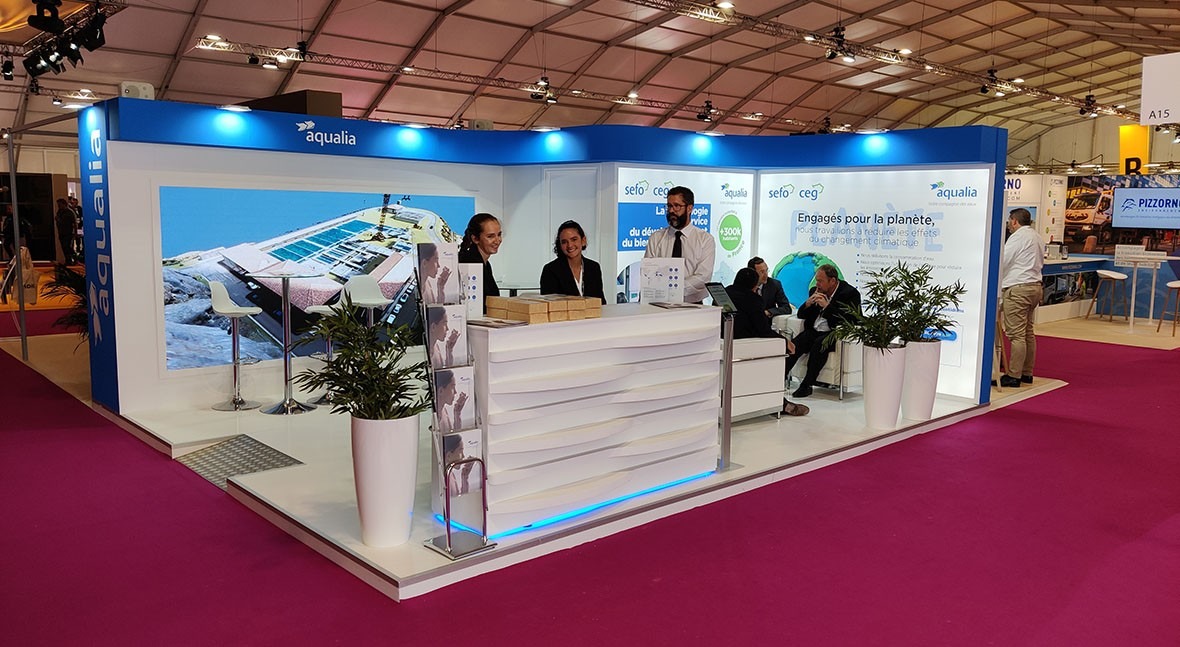Sustainability of water services, focus of debate in fora in Colombia, France and Saudi Arabia
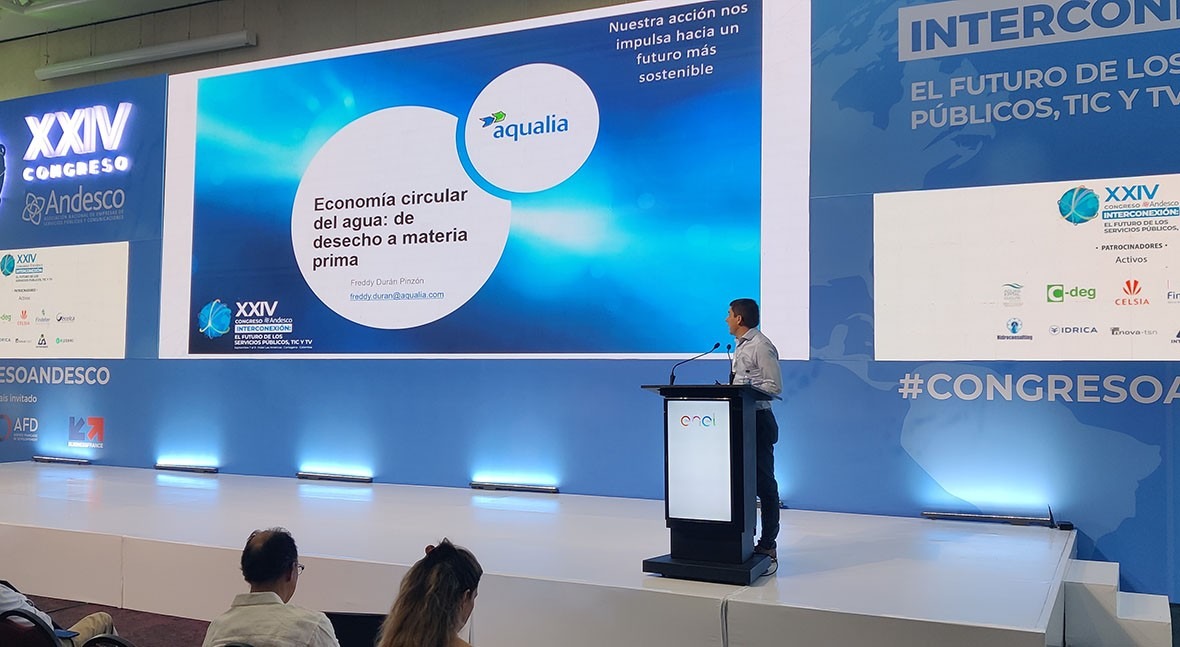
In recent weeks, several capitals around the world have hosted meetings to discuss and study the sustainability of public services. Aqualia has participated in these fora which, from Paris to Cartagena de Indias, passing through Riyadh and Copenhagen, have analysed the best processes to promote compliance with the Sustainable Development Goals (SDGs) promoted by the United Nations and have presented examples of good practices associated with them.
Internationalisation is, together with digitalisation, one of the key axes in Aqualia's present and future performance. Both challenges, which are closely related to sustainability, "make up the company's roadmap", as Félix Parra, CEO of the company, points out in #Act, the 2021 Sustainability Report.
Aqualia's activity is closely linked to sustainable growth and international expansion that responds to the global need for clean water and sanitation, especially in Europe, America, and MENA. Within this framework, the company has recently participated in various key events for the water sector in Colombia, France and Saudi Arabia.
Andesco 2022 Congress, in Cartagena de Indias (Colombia)
Aqualia actively participated in the Congress "Interconnection: the future of utilities, ICT and TV", promoted by Andesco, the National Association of Public Utilities and Communications Companies of Colombia.
The event, held during the first week of September in the city of Cartagena de Indias, focused on economic reactivation and included a top-level agenda. Freddy Durán, Aqualia's Deputy Director of Production in Colombia, participated in the event with a presentation entitled "Circular water economy: from waste to raw material", in which he explained how the company faces the global challenges for the sustainable use and management of water, through a circular economy model based on the recovery and transformation of organic material to convert it into organic by-products that can have a new life. In this sense, Durán explained Aqualia’s objective of converting wastewater treatment ![]() plants into circular stations or biofactories capable of recovering, transforming and recovering waste into usable resources, using them for agricultural purposes or for energy recovery.
plants into circular stations or biofactories capable of recovering, transforming and recovering waste into usable resources, using them for agricultural purposes or for energy recovery.
With close to 3,000 attendees and 6,000 virtual attendees, and more than fifty hours of content, as well as an extensive commercial exhibition, the 2022 Andesco Conference has become the most important meeting of the water sector in Colombia and, this edition, the most successful to date. The event was attended by the Ministers of Finance, José Antonio Ocampo; of Environment and Sustainable Development, Susana Muhamad; of Mines and Energy, Irene Vélez; and of Housing, Catalina Velasco.
In her speech, Muhamad invited organisations and municipalities to think about a national biogas policy based on organic waste, and to work for innovation and increased citizen participation in territorial social agreements. "The work in the area of biogas is notorious, it is necessary to generate in-novation cycles and contribute to the energy transition through collective work with a common purpose: Collaborative Governance", said the president.
In closing, the manager of Andesco, Camilo Sánchez, highlighted public-private collaboration as a lever to steer Colombia towards sustainability: "We must accelerate the energy transition without ignoring the competitive advantages we have as a country. Here we are looking for a solution and working with all the different sectors. Here we have public, private, and mixed companies that want to have the best solutions and prices for the country's citizens".
To conclude, Gustavo Petro, recently elected President of Colombia, closed the Congress with a speech in which he made special mention of the problem of rising energy costs and their impact on the lives of citizens.
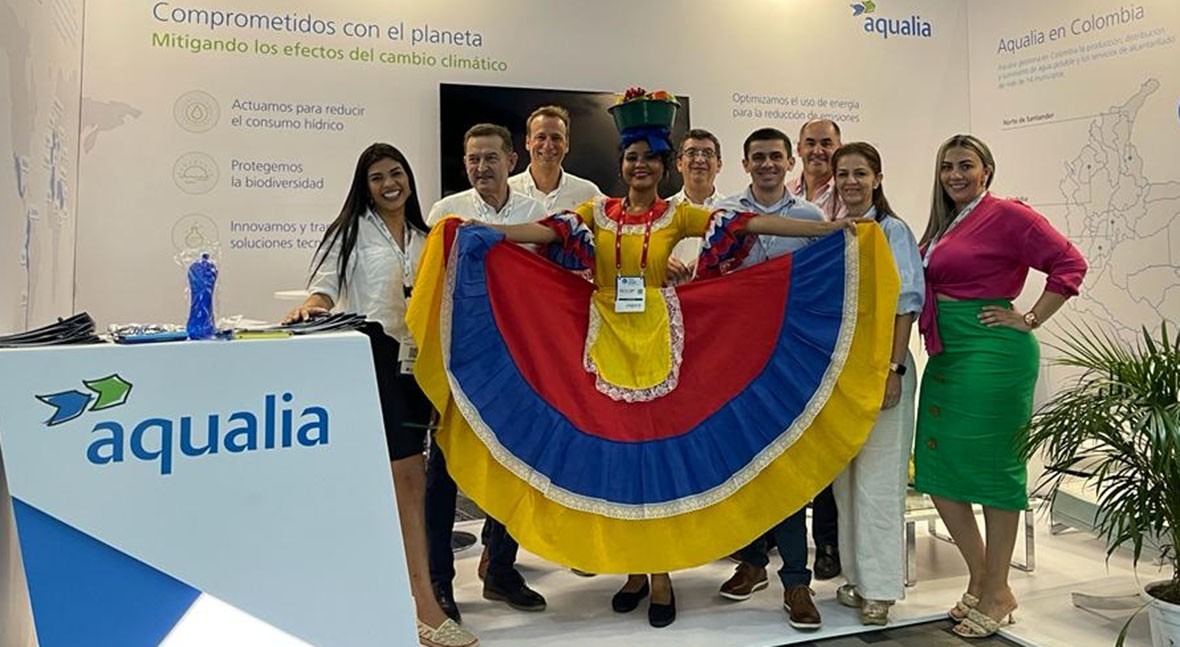
Espace Collectivités, the meeting point for municipal service managers in France
Aqualia's objective is to generate value and well-being by promoting social cohesion, and collaborating with public administrations and social agents in the transformation of cities into smart and sustainable spaces. In a context marked by the persistent drought that is sweeping Europe, the Espace Collectivités event, held in Paris in September, has become, in its 38th edition, a municipal meeting point in which to propose responses to the great challenges of the future, such as urban development, energy supply, sustainable transport, efficient management of the water cycle, ecological transition and social cohesion and solidarity policies.
Aqualia, present in France since 2019 when it acquired the companies SEFO and GEG, which operate in the area near Paris, has demonstrated at this event that it is already a leading player in the French market with the management of municipal water and sanitation services for 300,000 French citizens.
At the Espace Collectivités event, Aqualia presented its most advanced technological solutions for dealing with the climate emergency (waste-water re-use, intelligent network management and digitalisation, among other tools) and its firm commitment to sustainability.
In this regard, the company has taken advantage of the fair to launch the French version of its #Sosteniblómetro project, with which it aims to determine the degree of commitment of citizens and communities to sustainability and to raise awareness of environmentally friendly daily behavioural habits oriented towards sustainable development.
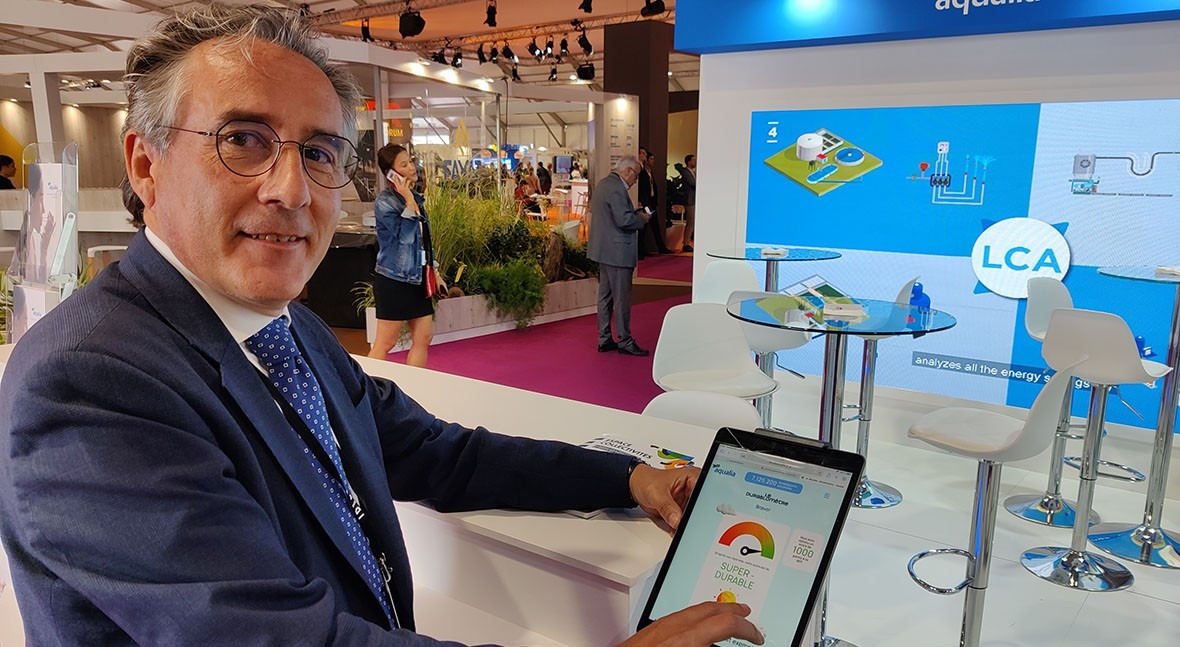
 “The future of desalination", under debate in Riyadh
“The future of desalination", under debate in Riyadh
At the same time as these two events, in Riyadh, the capital and main business centre of Saudi Arabia, Aqualia participated in the congress "The future of desalination", sponsored by the public company SWCC (Saline Water Conversion Corporation) and promoted by the British media Global Water Intelligence.
The meeting focused on debating the keys to sustainable desalination from an environmental and financial point of view. To this end, it was attended by hundreds of delegates from the Saudi public administration, especially from the world's largest desalination off taker, the SWCC, and executives from the main companies in the sector.
In Riyadh, the capital and main business centre of Saudi Arabia, Aqualia participated in the congress "The future of desalination"
Víctor Monsalvo, head of the Eco-efficiency area in Aqualia's Innovation & Technology department, presented the company's strategic lines in this field and two of its most ambitious projects: Rewaise and Sea4value, projects that promote new business models based on the circular economy.
Farid Fentazi, Head of Production at the Cap Djinet desalination plant in Algeria, also spoke at the event, presenting the success story of this important desalination plant in the Maghreb, which has been producing 100,000 m3 of desalinated water per day for a decade in a region with chronic water deficits and guaranteeing the economic and social development of the region
 Recognised by the IWA in Copenhagen
Recognised by the IWA in Copenhagen
In parallel to these international events, Copenhagen (Denmark) hosted the IWA World Water Congress and Exhibition, where the International Water Association recognised Aqualia as one of the leading companies in sustainable water management (Climate Smart Utility). The award recognises the contribution of companies linked to the end-to-end water cycle that carry out differential actions for the climate in three pillars: adaptation, mitigation, and leadership.
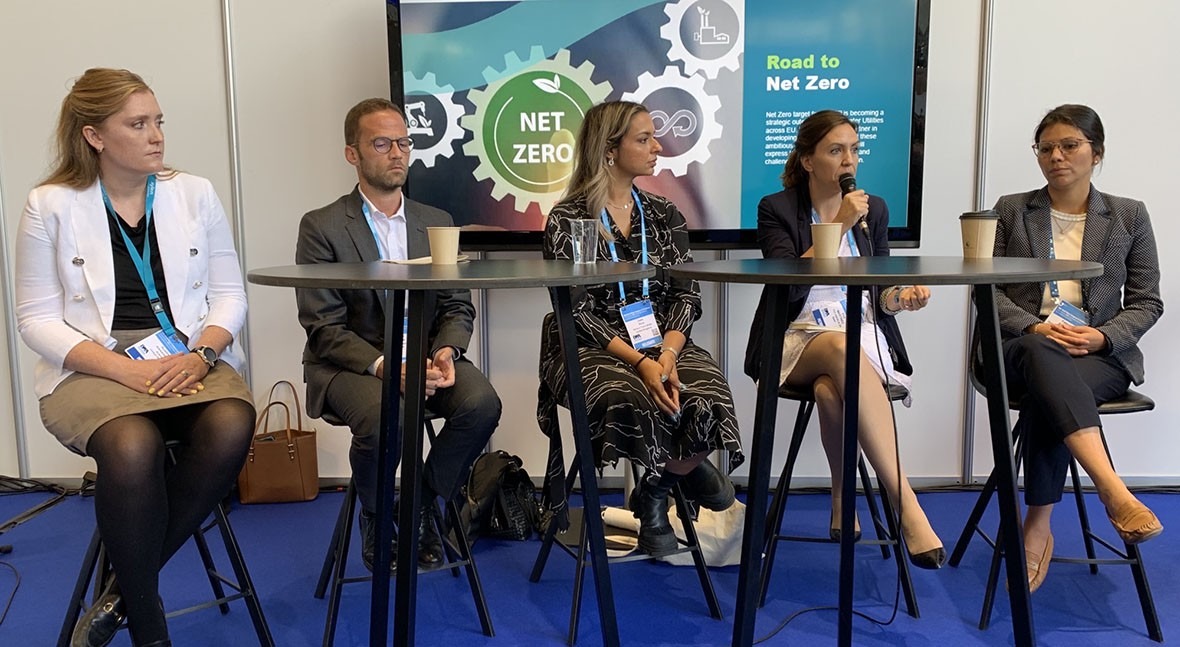
Eva Martínez, head of the Smart Management area in Aqualia's Innovation and Technology department, participated in one of the sessions in which the IWA recognised the leading utilities in carbon footprint reduction, held under the title "Towards Climate Smart Utilities". Martínez also took part in the session "Road to Net Zero", which addressed the solutions supported by new technologies that can be used to mitigate and alleviate the effects of climate change and achieve sustainability in public water services.
At the same event, Zouhayr Arbib, head of the Sustainability area of Aqualia's Innovation & Technology department, moderated the workshop "Sustainable Small Wastewater Treatment Plants: Present, Future, Opportunities and Challenges", in which the IntExt project, already implemented at the Talavera de la Reina wastewater treatment plant (Toledo, Spain), was presented.
This project represents a revolution in the field of wastewater treatment, as it proposes flexible and adaptable solutions to the different types of wastewater from different territories. The great contribution of IntExt is that it makes it possible for small and medium-sized populations to have access to advanced wastewater treatment, which is usually associated with large cities.
Aqualia’s performance in recent years places the company at the forefront of actors that take on sustainability as a global challenge
Patricia Zamora, head of projects in Aqualia's Innovation & Technology Department, also took part in the workshop "High value products based on carbon in wastewater - How do we select and is it sustainable?", where she presented the Deep Purple Project and showed her poster "Low-cost Wastewater Treatment for Small Populations Using Purple Phototrophic Bacteria In Anaerobic Photobioreactors".
Aqualia's presence at these four international events not only highlights the company's geographical expansion and reinforces its example of end-to-end water cycle management throughout the world, but also places the organisation at the forefront of players who take on sustainability as a global challenge.
Aqualia is the only company in the water management sector that accredits its contribution to the SDGs through the integration of management systems in its international policy. In addition, it shares with its stakeholders the firm objective of integrating triple sustainability as a transversal aspect of the strategy to be followed in the coming years.



